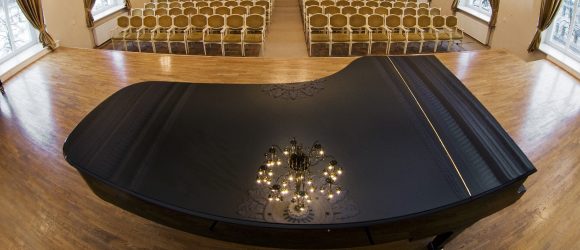Defense of the artistic research project “Piano Cchool of Sulamita Aronovsky: the Continuity of Performance Traditions”
- 2020-12-14
- | News

On July 2, 2020, the defense of Mantautas Katinas “Piano Cchool of Sulamita Aronovsky: the Continuity of Performance Traditions” will take place at the Lithuanian Academy of Music and Theatre. Artistic Supervisors: Prof. Petras Geniušas, Prof. Habil. Dr. Leonidas Melnikas. Copies of the research paper and its summary are available at the library of the Lithuanian Academy of Music and Theatre (Gedimino pr. 42).
Free entrance.
Defense of the creative part of the artistic doctorate project
July 2, 2020, 10 a.m.
LMTA Building 1: Juozas Karosas Hall (Gedimino Ave. 42, Vilnius)
PROGRAM
L. van Beethoven – Sonata no. 17 in D minor, op. 31 no. 2
F. Schubert – Impromptu no. 4 in A-flat minor, op. 90 D. 899
F. Liszt – Sonata in B minor
CHAIRPERSON OF THE DOCTORAL THESIS DEFENCE BOARD:
Prof. Rūta Rikterė (Lithuanian Academy of Music and Theatre)
MEMBERS OF THE BOARD:
Prof. Aleksandra Žvirblytė (Lithuanian Academy of Music and Theatre)
Assoc. Prof. Daumantas Kirilauskas (Lithuanian Academy of Music and Theatre)
Prof. Dr. Audronė Žiūraitytė (Lithuanian Academy of Music and Theatre)
Prof. Dr. Per Dahl (University of Stavanger)
REVIEWERS:
Prof. Sergej Okruško
Prof. Dr. Lina Navickaitė-Martinelli
Abstract
The artistic research looks into the piano performance education principles of Sulamita Aronovsky for the first time. Aronovsky – piano professor at the Royal Academy of Music, the founder and Chair of Jury of the London International Piano Competition, and a noted authority on piano education, was born in Lithuania, where she studied, started her artistic career, taught and lived for more than 30 years. She later moved to the UK, where her professional achievements and success were internationally acknowledged. The content of the piano performance education principles of Aronovsky is reproduced in accordance with the parameters of sound and phrase, performance style, structure of the composition, and performance psychology. Conversations with Aronovsky and eleven interviews with her former students, including such musicians as Vovka Ashkenazy, David Fanning, Ian Fountain etc., support the statement that Aronovsky has preserved the artistic principles of her teachers, especially Alexander Goldenweiser, almost unchanged. That makes her piano pedagogy exceptional, particularly nowadays when national piano schools no longer exist in their previous form. The research confirms the assumption that the effectiveness, integrity and authenticity of Aronovsky’s system of piano performance education provide the basis to call it an individual piano school, which is perhaps one of the purest examples of the continuity of the mid-20th century Russian piano traditions.

